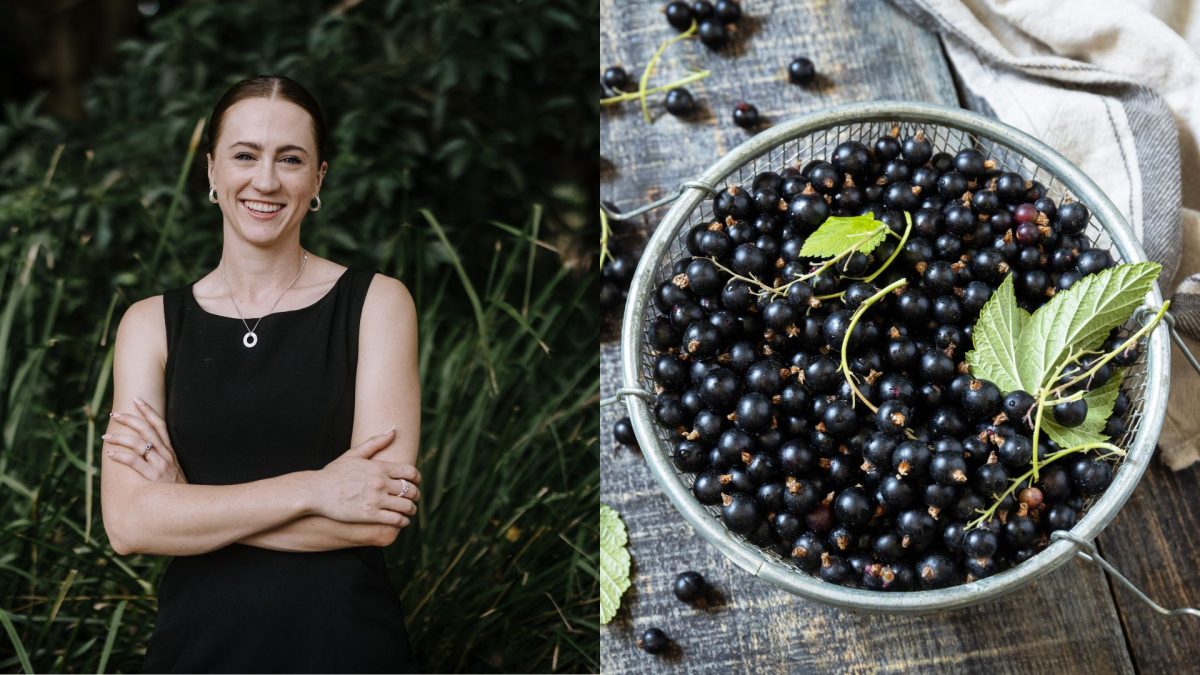
UOW’s Denelle Cosier is exploring how black currants can help ease symptoms of inflammatory bowel disease. Photo: Michael Gray/UOW & Envanto/khramovaelena.
A chemical compound found in black currants could help provide relief to people suffering with ulcerative colitis, with new research set to explore the anti-inflammatory benefits of the common fruit to people with the debilitating disease for the first time.
University of Wollongong researcher and dietitian Denelle Cosier is leading a study which aims to better understand how a new combination of dietary supplementation could ease symptoms for tens of thousands of Australians managing the type of inflammatory bowel disease.
“It’s predominantly managed through medication and consists of people having chronic ulcers throughout their colon, so the type of ulcers you might have in your mouth but in the large intestine,” Denelle said.
“We don’t know yet very much about how diet plays a role in the disease management, but people living with ulcerative colitis are really interested and want to know what they can eat to make it worse or better.”
They hope to find an untapped solution to support current treatments by using the berry.
“Black currants are actually really high in a chemical compound called a polyphenol, specifically an anthocyanin polyphenol, and that chemical compound gives it the dark blue/purple colour that you see in black currants and in blueberries particularly,” Denelle said.
“That compound has shown the possibility to be quite a strong anti-inflammatory molecule in different human populations but we haven’t yet researched the potential benefits it could bring to people with ulcerative colitis.”
The clinical study will use the compound in a concentrated form and in combination with other methods to see if there are improvements in gut health.
“What we’re doing is we’re giving a couple of different nutritional supplements, so one is a very well researched probiotic, and the other is the black currant powder,” Denelle said.
“We’re giving it to participants with ulcerative colitis for 12 weeks and we want to see what it does to their inflammation levels and also to the gut microbiome, so the community of bacteria living in the gut.”

A chemical compound found in black currants will be concentrated into a powder. Photo: Michael Gray/UOW.
While the solution is not likely to be as simple as eating a couple of berries a day, it could offer an additional support to a lot of people with ulcerative colitis who are required to take strong medication and are still feeling the impact of the disease.
“We are anticipating that these supplements will improve their quality of life and we’re hoping to see reductions in their inflammation, any of which is beneficial for long-term disease management.”
And the results could help inform further research in this area to help find additional options for people with the disease and potentially expand research to look at patients with other inflammatory conditions such as Crohn’s disease.
“We’re expecting it to be directly beneficial to the participants but also the kind of data we’re generating means that we’re going to be able to understand a bit more in terms of how the microbiome, inflammation and diet all play together.
“And so directing future research to studies that can target particularly the microbiome in ulcerative colitis, I think can provide more of those personalised dietary interventions.”
Researchers are still recruiting participants who have ulcerative colitis from across the country.
People over 18 years of age with the disease who have not had bowel surgery, are not pregnant or lactating, are encouraged to apply.
To find out more or to be involved in the study contact Denelle Cosier at [email protected]
Original Article published by Keeli Royle on Region Illawarra.


